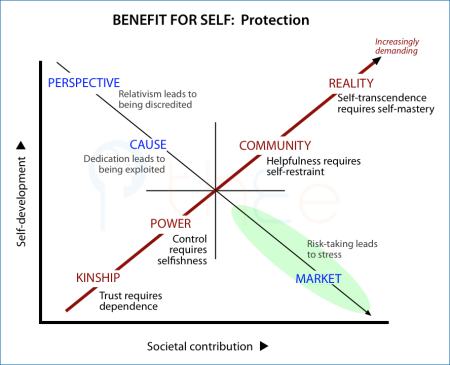Benefit for Yourself 2: Protection
Well-Being Set
■ Self-protection is valued above Autonomy

-
Kinship-centredness provides self-protection—material and emotional—through trust and dependence on family members.
At the extreme, kin should be prepared to sacrifice themselves for each other. The family seeks to be self-sufficient and shares its resources amongst members to the exclusion of outsiders.
![]() Personal autonomy must be suppressed …
Personal autonomy must be suppressed …
- Power-centredness provides self-protection through selfishly controlling others and as much of the social environment as possible. The individual is sensitive to possible threats, asserts status and is ready to threaten, intimidate or fight.
![]() Personal autonomy is constrained …
Personal autonomy is constrained …
- Community-centredness provides self-protection through social support and reciprocity for help given. Intuitive awareness and respect for feelings and expectations are also protective.
![]() Personal autonomy is self-limited …
Personal autonomy is self-limited …
- Reality-centredness provides self-protection through transcending the self and applying self-mastery to dispense with egoism and reduce enslavement by personal wishes, interests or doctrines.
![]() Personal autonomy is paradoxically limited …
Personal autonomy is paradoxically limited …
Moving up the well-being diagonal, protection becomes ever more personally demanding, so seeing reality, however painful, is paradoxically most protective.
![]() More:
More:
■ Autonomy is valued above Self-Protection
On the , exposure to risk is inevitable and security is hard to ensure.
- centred individuals are exposed to stress from business deals and investments on a daily basis and there is no place to hide.
- centred individuals are vulnerable, from speaking their mind and making attacks on conventionally accepted activities.
- centred individuals are discredited or disliked for refusing to join in public condemnations of certain values or groups.
- More on valuing production.
Originally posted: July 2009